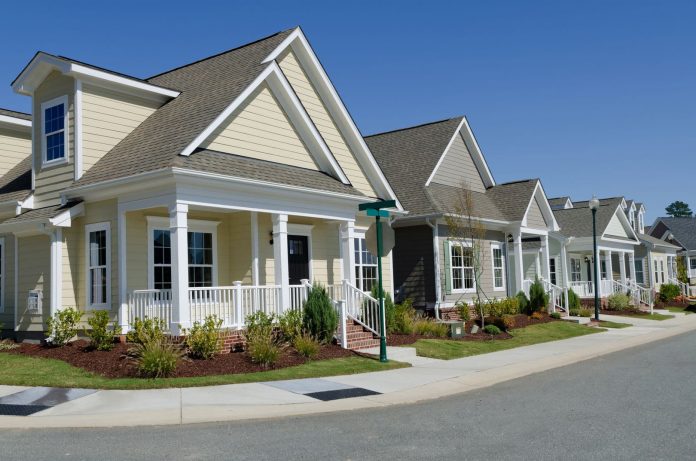
Many Americans can find themselves having a hard time keeping up with their housing costs. This includes rent, utilities, etc. Luckily, if you are dealing with this, you are not alone in your struggle. There is a way that people can begin their journey towards affordable housing. It’s just that many people don’t know where to start. However, it’s easier than you may think to get affordable housing that works for your budget.
Understanding Your Budget
Before you can find out ways to begin towards affordable housing, you must first know what affordable housing means for your budget. That’s because affordable housing won’t look the same for everyone! There is a general guideline on what it means to have affordable housing though. According to the United States Department of Housing and Urban Development (HUD), a household will have affordable housing if they spend no more than 30% of their gross income towards housing expenses. These housing expenses include utilities!
So if you make $1,920 a month then you should aim to spend no more than $576 towards your housing expenses. If you spend more than 30% of your income towards these expenses, your household can be considered cost-burdened. When a household is cost-burdened, it can have a chain reaction and lead to other financial issues. For example, cost-burdened households can have a hard time affording other expenses like groceries, transportation, medical care, and more.
How to Begin Your Journey Towards Affordable Housing
Now that you know your budget and what affordable housing means for your financial situation, you will want to take the steps to get it! There are a few places you can start when it comes to reviewing available housing support that could be beneficial to your situation. You can check out:
- Your Local Public Housing Authority (PHA)
- Benefits.Gov
- 211.Org
Your Local Public Housing Authority (PHA)
Your local PHA is a great place to start when it comes to finding affordable housing. That’s because this local administrative agency is designed to help those in need. It is funded by the United States Department of Housing and Urban Development (HUD). That means that PHAs have a bunch of information on housing assistance, support opportunities, and more. The best part? The support from PHAs is completely free. The information they provide can give guidance to what programs a person may be eligible for. In fact, this is even the place where you can submit an application for different housing assistance programs.
Benefits.Gov
Besides checking out available affordable housing programs at your local PHA, you can also do some research on your own. The government has plenty of opportunities when it comes to programs that can help people in need. That is why they have a site that keeps information about these programs. Since this site has a lot of information, it has tools for users to choose from.
People can review available support programs through the site’s Benefit Finder tool. However, they can also search by agency or category. When using the Benefit Finder tool, users can put in specific details about their situation. Once they put in these details, the tool will look for support opportunities that may be able to help their exact situation. This makes it easy to find available assistance that could be just what you need for what you’re dealing with. However, the programs they show will not be a guaranteed source of support. That ‘s because the only true way to tell your eligibility is by submitting an application for the support program. This site contains details on where you will need to apply and contact information if applicable.
Browse by Category or Agency
You can also choose to search for assistance through an agency or category. This is a great option for people that don’t feel comfortable filling out personal details or for those that already know generally the type of support they are looking for. For example, you can search for support programs available through HUD or find programs that can help with Housing and Public Utilities.
211.Org
There are resources available to review local housing opportunities and provide housing resource information. This is when 211.org comes into play. This is a website that allows people to review information about local services and resources that may be able to help their situation. This website can help people with a bunch of needs like food, healthcare, etc. It can also specifically help with people that are in need of affordable housing. In fact, they were able to provide 4.8 million connections to help reduce and prevent housing insecurity (and homelessness) to those that reached out.
When it comes to housing support, you can turn to your local 211 to get help finding support options for figuring out your housing expenses like rent payments, utility bills, mortgage payments, and more. When you reach out to this resource you should expect to provide information like details about your current living situation, income, etc. This can help them provide the most personalized support for your needs.
What Affordable Housing Options are Available?
Besides the resources we mentioned above, there are some other things to keep in mind when it comes to affordable housing. There are some opportunities out there that are designed to help people in need. A few popular housing support options include:
Housing Choice Voucher Program
Many people also know this program as Section 8. Regardless of what you call this support opportunity, it is important to know that it may be able to help! This is a federal program available thanks to the United States Department of Housing and Urban Development (HUD). It is designed to provide eligible recipients with safe, sanitary, and decent housing in the private market. The way that the program works is that an applicant will need to begin the application process at their local Public Housing Authority (PHA). If the PHA approves the application, then the recipient will likely be placed onto a waiting list. That’s because this program has a lot of demand and limited supply.
Once it is time for the recipient to receive benefits, they will get housing choice vouchers. These vouchers are administered and managed through the local PHA even though HUD funds the program. The recipients will need to find housing in the private market that accepts these vouchers as a form of payment. There are a variety of different types of properties that accept these vouchers which includes apartments, townhomes, and even single-family homes! However, besides accepting the vouchers as a form of payment, they must also pass inspections conducted by the local PHA.
If the property checks out then the housing choice voucher is paid to the landlord of the property directly by the PHA on behalf of the recipient. Then the household will typically need to pay the difference between the actual rent amount minus the amount that the voucher covered. It is important to keep in mind that some recipients may be able to use the voucher towards buying a home instead!
Eligibility
Not everyone is eligible to benefit from this support opportunity. Instead, only those that meet eligibility requirements set by their local PHA can qualify. There are four main eligibility requirements that local PHAs keep in consideration when it comes to determining who qualifies for these vouchers. These four factors are:
- Income Level
- Family Status
- Eviction History
- Citizenship Status
It’s also important to keep in mind some general rules. For example, typically a family should not make more than 50% of the area’s median income (AMI) if they want to qualify. If you want to apply to this program or learn more information you should get in touch with your local PHA. If you need even more assistance you can also reach out to your closest HUD Office.
Public Housing
Another housing support option that is available through HUD is Public Housing. This housing program includes housing units that are owned and managed by local housing agencies (HAs). Even though most people think of public housing in the form of an apartment only, they actually come in a variety of types! This can include single-family homes as well. The rents for public housing units are at an affordable rate that recipients can handle. Your local HA will determine eligibility based on the following factors:
- Family Status
- Citizenship Status
- Yearly Gross Income Level
- References
While all factors listed above are important, we want to specifically make a note about references! Even if you meet all other qualifications, your references still play an important part. That’s because your local HA has the right to deny you as an applicant if your references don’t confirm that you would be a good tenant. If eligible to receive this assistance, your HA is basically your landlord. That means you would need to sign a lease with them and potentially even provide a security deposit! If you want to apply to this program or learn more information you should get in touch with your local HA. If you need even more assistance you can also reach out to your closest HUD Field Office.
Supportive Housing
Sometimes when people are dealing with issues when it comes to their housing situation, it can get bad. In fact, some people can find themselves dealing with homlessness and in need of support right away. That is why it is important to keep supportive housing opportunities in mind. There are a variety of supportive housing options to consider which includes:
- Emergency Shelters
- Permanent Supportive Housing (PSH)
- Transitional Shelters
- Rapid Re-Housing (RRH)
Emergency Shelters
Sometimes, households can find themselves without housing, especially when they are dealing with times of financial hardship. When they need some short-term stability, they can turn to emergency shelters. These shelters aim to provide support to people in need which includes helping people find long-term housing for their situation. The length of time that people can stay in this type of shelter will vary depending on the specific shelter.
Permanent Supportive Housing (PSH)
This is a type of “housing first solution”. Why is that important? Well it means that this support aims to help people immediately. A housing first solution focuses on recovery of an individual while helping them reach independence and permanent housing. This supportive housing option is designed to help people that are chronically dealing with homelessness. The United States Department of Housing and Urban Development (HUD) defines a person as chronically homeless if they meet one of the following conditions:
- Have lived in place that’s not meant for human habitation (for a minimum of 1 year or over the course of 3 years in 4 separate instances that has a total length of 1 year)
- Live in Institutional Care Facilities (for no more than 90 days and have lived in the other options on this list before they entered the facility)
- Have lived in a Safe Haven (for a minimum of 1 year or over the course of 3 years in 4 separate instances that has a total length of 1 year)
- Have lived in an Emergency Shelter (for a minimum of 1 year or over the course of 3 years in 4 separate instances that has a total length of 1 year)
PSH can be a long-term support opportunity to help people that need it. It also provides support resources besides housing support.
Transitional Shelters
Transitional shelters are a type of supportive housing opportunity that can give people the chance to stay for a relatively long amount of time. The exact amount of time that a person can stay in these shelters will vary depending on the shelter. However, they can typically stay for 6 months to 24 months. Just like the other options on this list, this shelter can also provide supportive services to people dealing with homelessness that are in this shelter.
Rapid Re-Housing (RRH)
Another type of “housing first solution” is RRH. This is a type of supportive housing opportunity that aims to help people that don’t normally deal with homelessness. When people don’t normally deal with homelessness it is known as non-chronic homelessness. Through RRH, individuals have the opportunity to rent an apartment on their own and benefit from temporary community supportive services.
Affordable Housing Tips to Keep in Mind
Besides the information we talked about above, there are even some tips to keep in mind that can help people make their housing more affordable. These tips include:
- Keep the Location in Mind
- Get a Roommate
Keep Location in Mind
The area of your housing can mean a world of difference when it comes to how much you will spend. For example, the average cost of a one bedroom apartment in Bismarck, North Dakota is $985 as of June 2022. On the other hand, the average cost of a one bedroom apartment in Calabasas, California is $3,261 as of June 2022. That is why you want to check out different areas if you aren’t tied down anywhere.
Get a Roommate
It is important to find a roommate that you trust! If you are able to find one then you could split your housing costs in half. For example, let’s say that rent for a one bedroom apartment would be $1,500. On the other hand, rent for a two bedroom apartment would be $2,000. You can split the cost of a two bedroom apartment with a roommate and end up paying $1,000 for your portion which is cheaper than living on your own!
Additional Support Opportunities to Consider
Besides getting support specifically for housing expenses, people may be able to benefit from additional support opportunities. For example, let’s say you get support for your groceries so you spend $853 less a month on groceries. That means that money can be freed up to go towards other expenses like housing! Some popular federal programs that may be able to help include:
- Children’s Health Insurance Program (CHIP)
- Lifeline Program
- Medicaid
- Medicare
- Special Supplemental Nutrition Program for Women, Infants, and Children (WIC)
- Supplemental Nutrition Assistance Program (SNAP)
- Supplemental Security Income (SSI)
- Social Security Disability Insurance Program (SSDI)
- Temporary Assistance for Needy Families (TANF)
Bottom Line
Getting affordable housing can seem like an impossible task. Luckily, there are support options available that may be able to help. HUD defines affordable housing as being no more than 30% of your gross income. When starting your journey towards affordable housing, you want to make sure that you understand your budget and financial situation first. This can help you understand the goals that you should keep in mind on what it means to have affordable housing for your specific situation. There are a variety of resources to consider when it comes to affordable housing. These resources include:
- Your Local Public Housing Authority (PHA)
- Benefits.Gov
- 211.Org
They can help provide you information and get you started on some affordable housing opportunities that may be able to help your current situation. Besides these resources, you can also keep some specific affordable housing opportunities in mind like:
- Housing Choice Voucher Program
- Public Housing
- Supportive Housing
There are even some other affordable housing tips to keep in mind that can help you reduce how much you put towards housing expenses. That’s not all! You may even find that other support programs can help you get more manageable housing by providing relief in certain areas that can free up funds for you to use towards housing expenses. There is more support than you realize, you just need to know where to start. Hopefully, this article was able to point you in the right direction!




























